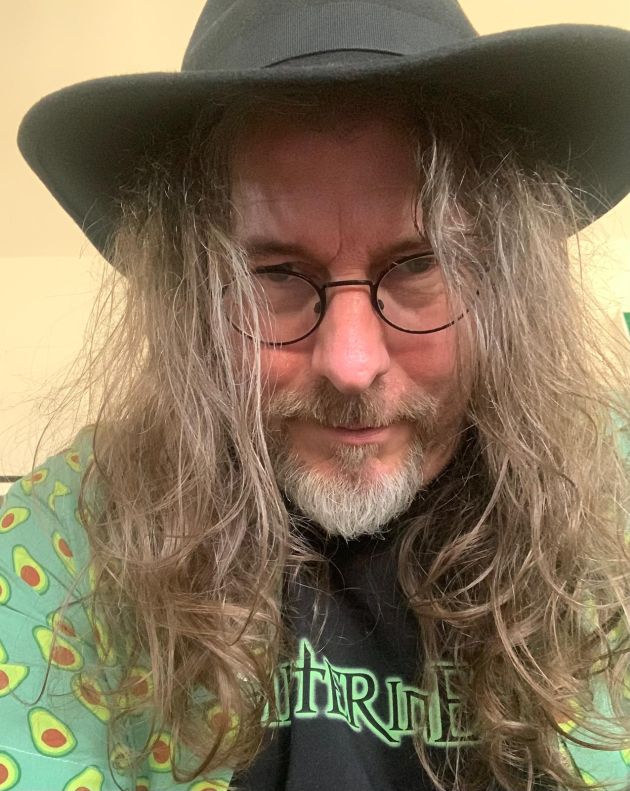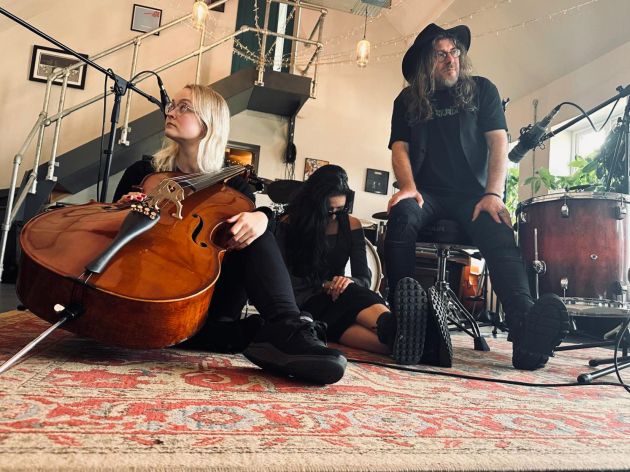 Interview with
Interview with Stephen Kennedy (songwriting, vocals, music) from Papillon de Nuit
There are artists who build songs like architecture, and there are those who breathe life into them like poems. PAPILLON DE NUIT belongs to the latter. Conceived by British songwriter and vocalist Stephen Kennedy, the project inhabits a world suspended between chamber music, dark romanticism, and Post-Punk introspection. It is a meeting point of melody and monologue, of dust and light, where poetry and sound intertwine until they become inseparable.
Kennedy, known for his literary sensibility and cinematic vision, crafts compositions that feel both intimate and grand - like fragments of forgotten theatre plays whispered into the dark. With cellos, piano, and voices orbiting his vivid songwriting, PAPILLON DE NUIT blurs the boundaries between song, performance, and confession.
In this conversation Stephen speaks about theatrical imagination, the interplay between dialogue and solitude, and the beauty of tension that holds his music together - fragile, luminous, and endlessly evolving.
Reflections of Darkness [RoD]: I’ve always felt that your songs are like miniature theatres - intimate, dimly lit, yet filled with luminous words. When you compose, do you imagine your music in this dramatic way, or does that theatrical quality emerge unconsciously?
Stephen: I always imagine each song inhabits a self-contained world that exists only for itself. And I do tend towards the dramatic, so a theatre comparison is a good one. Late at night. An empty auditorium. Vast, slightly faded drapes framing a dusty stage. ‘La Boheme’ meets ‘First and Last and Always’.
RoD: Listening to ‘Frozen Charlotte’, I had the impression of stepping into a confessional, as if the music itself had something urgent to reveal. Do you think of your songs as dialogues between instruments and voices, or more as monologues addressed directly to the listener?
Stephen: The song itself is a story told at a gallop - it’s about impatience and vanity. It’s a Victorian morality tale, so in that sense it does want to reveal the message swiftly. The story is the monologue, but the music is built organically in the studio and often changed or even improvised on the day. Our cellist will react to the percussion, the piano lines may alter to fit a shift in lyrics - it absolutely is a dialogue.
RoD: PAPILLON DE NUIT brings together such a diverse range of collaborators - cello, piano, percussion, poetry. I wonder how you balance your own vision with the individuality of each contributor, while still keeping a coherent artistic identity?
Stephen: Everyone involved in the project leaves a vital mark on each song, but the coherence comes from the writing, lyrics, and arrangements, which I do myself. I’ve an idea at the start of how I want it to sound, and what emotions I hope to squeeze, but everyone has an input into this once we are in the studio. The other vital element is having Steve Whitfield - who has worked with THE CURE - in the studio as producer. His ideas, persistence, attention to detail, and encouragement to pursue each idea also results in a coherence. We work very well together. His mixes are exquisite.

RoD: Your voice struck me as wonderfully versatile - at times Post-Punk, at times bardic, and sometimes whispered almost like a spell. Do you consciously play with these vocal archetypes, or is it more instinctive, depending on the mood and subject matter of each song?
Stephen: It definitely depends on the mood of the song. I don’t like to rehearse, I prefer to see what comes out on the day. It’s more honest that way. I’ve surprised myself sometimes at how I interpret my own songs. Sometimes - as on ‘Ariadne’ it was clearly best to leave it all to Megan, who’s a phenomenal singer. And poetry/spoken word sections were absolutely perfected by poet Monica - her words were also incorporated into the songs. I enjoy singing and speaking roles, but I like to have other voices taking part in the journey.
RoD: There’s a sense of urgency and fragility in your music, as if each song is both a fleeting moment and a lasting trace. How do you know when a piece is finished, given this tension between impermanence and endurance?
Stephen: I think you sum that up perfectly - the imagining of a song until its birth is, for me, a short process. I’m impatient to get my ideas into song. So this part is urgent, and also fleeting - when it’s done it’s done. But once it’s complete, and released…. it’s out there forever. It’s a legacy. You created something that will outlive you. You can fine-tune something forever, but a song will actually tell you when it’s done, if you can listen.
RoD: To me, PAPILLON DE NUIT feels less like a band and more like an interdisciplinary dialogue - where melody, poetry, and atmosphere are all in conversation with each other. Does this reflect how you see the project yourself, or do you experience it differently?
Stephen: I enjoy the lonely part - creating and rejecting and experimenting, and the feeling as emotions and atmospheres begin to emerge, the conversations between the differing parts of a song, and how they fit, evolve, and adapt. But I also love the sharing, all of us together in the studio, new faces and familiar ones. There’s almost a family feel. I love the enthusiasm everyone approaches each song with. Music is the highest form of communication and it’s wonderful to share that with a group of people. All the elements of a song should communicate, even if it is not in a harmonious way. Instruments want to be heard, ideas want to grow, atmospheres jostle for supremacy. Tension is the key.
RoD: You’ve mentioned the challenge of translating your intricate studio creations to the stage. Do you imagine PAPILLON DE NUIT live shows as more traditional concerts, or as something immersive, perhaps blurring the boundaries between recital, installation, and performance art?
Stephen: At the moment, there’s no plan to play live. There will be a couple of vinyl / CD EP’s first. But at some point I’ll put my mind to doing shows - and I’ll want them ludicrously elaborate, theatrical, and in amazing settings. Nothing else will suffice!
RoD: When I listen to your songs, I hear this constant movement between beauty and unease, light and shadow. Do you see PAPILLON DE NUIT as deliberately inhabiting this liminal space - not fully Gothic, not fully classical, but something in between?
Stephen: I could never just glue myself to one genre. I like to reflect what has influenced and interested me throughout my life. I have a passion for opera, and I love classical music. From my teens onwards I’ve inhabited just about every shadowy corner of goth, but I happily and periodically lose myself in Post-Punk, Black Metal, Post-Rock. Dark music has fragility and beauty, and it has harsh, frightening, melancholy and depressive aspects. I feel at home in any and all of these.
RoD: Even though time and mortality are recurring themes in your work, I also sense tenderness and moments of joy. How important is it for you to balance darkness with light in your music?
Stephen: A chord or key change can be enough in a song to go from utter blackness and despair, to soaring melodrama and joy - or the other way around. That perfectly captures the delicate balance in our emotions and outlooks. Death stares us in the face. But so does a sunset.
RoD: The name PAPILLON DE NUIT suggests transformation - fragile yet resilient, hidden yet luminous. Do you see this project not only as a musical endeavour, but also as a personal metamorphosis for yourself?
Stephen: This is a constantly transforming project, simply because I can’t imagine ever being rooted. We change every day, we adapt and cope (or not), we are influenced constantly by other people, the news, the weather, our health. So I wanted something that would fit with this shifting arc of emotions. And a night-creature represents some mystery, something hidden, beauty that we can’t always see. A moth really is a weird and wonderful creation - I like to think the same can be said about my music. New single - ‘The Pilgrim’s Arc’ - will be released at the beginning of November




